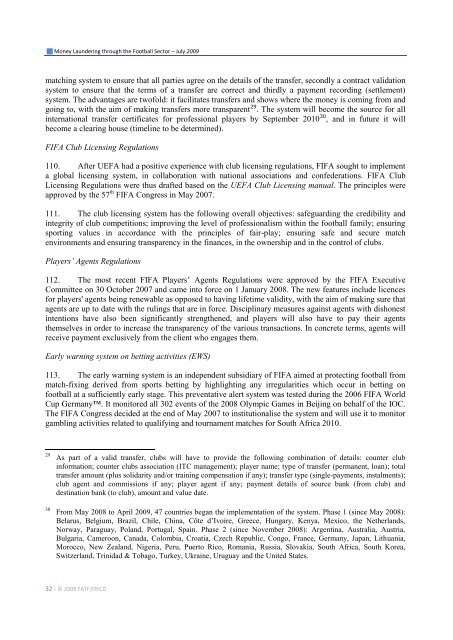Money Laundering through the Football Sector
Money Laundering through the Football Sector
Money Laundering through the Football Sector
Create successful ePaper yourself
Turn your PDF publications into a flip-book with our unique Google optimized e-Paper software.
<strong>Money</strong> <strong>Laundering</strong> <strong>through</strong> <strong>the</strong> <strong>Football</strong> <strong>Sector</strong> – July 2009<br />
matching system to ensure that all parties agree on <strong>the</strong> details of <strong>the</strong> transfer, secondly a contract validation<br />
system to ensure that <strong>the</strong> terms of a transfer are correct and thirdly a payment recording (settlement)<br />
system. The advantages are twofold: it facilitates transfers and shows where <strong>the</strong> money is coming from and<br />
going to, with <strong>the</strong> aim of making transfers more transparent 29 . The system will become <strong>the</strong> source for all<br />
international transfer certificates for professional players by September 2010 30 , and in future it will<br />
become a clearing house (timeline to be determined).<br />
FIFA Club Licensing Regulations<br />
110. After UEFA had a positive experience with club licensing regulations, FIFA sought to implement<br />
a global licensing system, in collaboration with national associations and confederations. FIFA Club<br />
Licensing Regulations were thus drafted based on <strong>the</strong> UEFA Club Licensing manual. The principles were<br />
approved by <strong>the</strong> 57 th FIFA Congress in May 2007.<br />
111. The club licensing system has <strong>the</strong> following overall objectives: safeguarding <strong>the</strong> credibility and<br />
integrity of club competitions; improving <strong>the</strong> level of professionalism within <strong>the</strong> football family; ensuring<br />
sporting values in accordance with <strong>the</strong> principles of fair-play; ensuring safe and secure match<br />
environments and ensuring transparency in <strong>the</strong> finances, in <strong>the</strong> ownership and in <strong>the</strong> control of clubs.<br />
Players’ Agents Regulations<br />
112. The most recent FIFA Players‟ Agents Regulations were approved by <strong>the</strong> FIFA Executive<br />
Committee on 30 October 2007 and came into force on 1 January 2008. The new features include licences<br />
for players' agents being renewable as opposed to having lifetime validity, with <strong>the</strong> aim of making sure that<br />
agents are up to date with <strong>the</strong> rulings that are in force. Disciplinary measures against agents with dishonest<br />
intentions have also been significantly streng<strong>the</strong>ned, and players will also have to pay <strong>the</strong>ir agents<br />
<strong>the</strong>mselves in order to increase <strong>the</strong> transparency of <strong>the</strong> various transactions. In concrete terms, agents will<br />
receive payment exclusively from <strong>the</strong> client who engages <strong>the</strong>m.<br />
Early warning system on betting activities (EWS)<br />
113. The early warning system is an independent subsidiary of FIFA aimed at protecting football from<br />
match-fixing derived from sports betting by highlighting any irregularities which occur in betting on<br />
football at a sufficiently early stage. This preventative alert system was tested during <strong>the</strong> 2006 FIFA World<br />
Cup Germany. It monitored all 302 events of <strong>the</strong> 2008 Olympic Games in Beijing on behalf of <strong>the</strong> IOC.<br />
The FIFA Congress decided at <strong>the</strong> end of May 2007 to institutionalise <strong>the</strong> system and will use it to monitor<br />
gambling activities related to qualifying and tournament matches for South Africa 2010.<br />
29 As part of a valid transfer, clubs will have to provide <strong>the</strong> following combination of details: counter club<br />
information; counter clubs association (ITC management); player name; type of transfer (permanent, loan); total<br />
transfer amount (plus solidarity and/or training compensation if any); transfer type (single-payments, instalments);<br />
club agent and commissions if any; player agent if any; payment details of source bank (from club) and<br />
destination bank (to club), amount and value date.<br />
30 From May 2008 to April 2009, 47 countries began <strong>the</strong> implementation of <strong>the</strong> system. Phase 1 (since May 2008):<br />
Belarus, Belgium, Brazil, Chile, China, Côte d‟Ivoire, Greece, Hungary, Kenya, Mexico, <strong>the</strong> Ne<strong>the</strong>rlands,<br />
Norway, Paraguay, Poland, Portugal, Spain. Phase 2 (since November 2008): Argentina, Australia, Austria,<br />
Bulgaria, Cameroon, Canada, Colombia, Croatia, Czech Republic, Congo, France, Germany, Japan, Lithuania,<br />
Morocco, New Zealand, Nigeria, Peru, Puerto Rico, Romania, Russia, Slovakia, South Africa, South Korea,<br />
Switzerland, Trinidad & Tobago, Turkey, Ukraine, Uruguay and <strong>the</strong> United States.<br />
32 - © 2009 FATF/OECD


